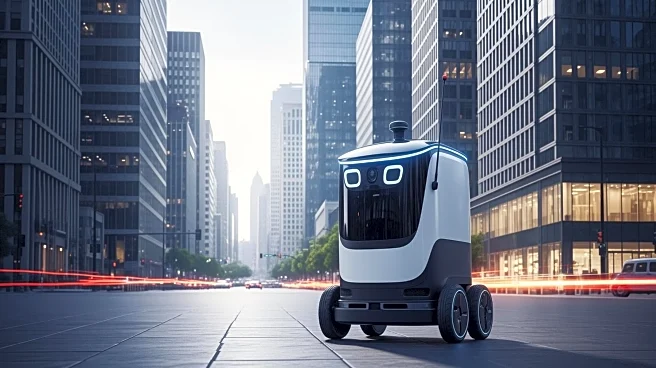What's Happening?
Neolix Beijing Technology Co., a leading developer of autonomous delivery systems, has raised over $600 million in Series D financing. This investment marks the largest private fundraising in China's autonomous driving sector to date. Neolix plans to use
the funds to expand its fleet of RoboVans, which are designed for urban logistics and can operate autonomously in complex traffic environments. The company has already deployed over 10,000 RoboVans across 300 cities in 15 countries, with significant operations in China. Neolix's vehicles are equipped with advanced AI-powered systems that allow for efficient route optimization and real-time data integration. The company aims to enhance its service network and user experience while accelerating commercial deployments to meet growing demand.
Why It's Important?
The expansion of Neolix's autonomous RoboVan fleet is significant for the urban logistics sector, particularly in densely populated areas where efficient delivery systems are crucial. The use of autonomous vehicles can help alleviate labor shortages and manage increasing parcel volumes, which are common challenges in the logistics industry. By reducing reliance on human drivers, Neolix's technology could lower operational costs and increase delivery efficiency. This development also highlights the growing trend of integrating advanced AI technologies into logistics, potentially setting a precedent for similar innovations in the U.S. market. Companies involved in logistics and urban planning may need to adapt to these technological advancements to remain competitive.
What's Next?
Neolix plans to continue its expansion into new markets, including fresh food, cold chain, and urban freight sectors. The company is also looking to enhance its technology through further research and development. As Neolix scales its operations, it may influence regulatory frameworks and urban infrastructure planning, particularly in cities looking to adopt autonomous delivery solutions. The success of Neolix's expansion could encourage other companies to invest in similar technologies, potentially leading to a broader adoption of autonomous vehicles in logistics worldwide.
Beyond the Headlines
The deployment of autonomous delivery vehicles raises important ethical and legal considerations, such as data privacy, safety standards, and the impact on employment in the logistics sector. As Neolix and similar companies expand, there may be increased scrutiny from regulators and the public regarding these issues. Additionally, the shift towards autonomous logistics could drive long-term changes in urban planning and infrastructure development, as cities adapt to accommodate these new technologies.


















